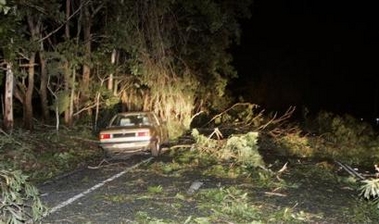Soldiers carried aid to the cyclone-shattered town of Innisfail Tuesday as
residents picked through streets littered with rubble and mangled roofs
destroyed by one of Australia's most powerful cyclones in decades.

A car is seen stuck under
fallen trees on one of the main roads outside Cairns leading to Innisfail after
cyclone Larry swept through the region on Monday, March 20, 2006. The cyclone
ripped roofs off buildings across Australia's northeastern coast packing winds
up to 290 kph (180 mph), leaving an unknown number of people homeless but
causing only a handful of minor injuries. [AP]
Troop trucks rumbled through the streets of Innisfail, the town of 8,500 that
bore the brunt of Category-5 Cyclone Larry when it slammed into the coast of
northeast Australia just before dawn Monday. By Tuesday, it had been downgraded
to a tropical storm.
"One of the most immediate needs is to get shelter over roofless homes, and
there are many," said Charlie McKillop, a spokesman for Attorney General Philip
Ruddock, whose department was helping coordinate aid.
Bob Katter, a local lawmaker, said about 7,000 people were left without
homes.
"There most certainly would be around 7,000 people ... that are effectively
homeless," he told The Associated Press. "They're sitting in four walls but no
roof."
Amazingly, the storm caused no reported fatalities, and only 30 people
suffered minor injuries.